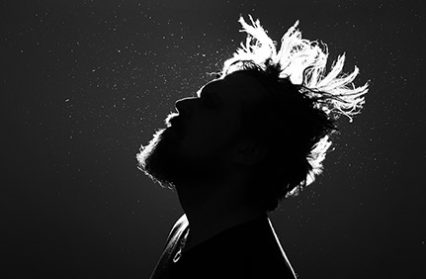Wales Millennium Centre, Cardiff
Those unfamiliar with John Grant and his work may be surprised to discover that any festival purporting to focus on the power of the vocal as its main theme could not really be taken seriously without having him on the bill. It would be a very fine performance indeed that tops this one for energy, humour, virtuosity, musicianship, craftsmanship, and vocal panache, at this inaugural Festival of Voice. The Festival has its centrepiece, has its “moment of zen”.
Grant’s rise from small-time cult figure with the Czars and then his first solo record, The Queen of Denmark (2010), to big-time cult figure, who sells out such halls as Festival and Albert on regular turns, could hardly be classed as meteoric (he is in his late forties now), or without its slides and slumps (many of his songs tackle insecurities, low self-confidence and esteem, and his battles with depression). He appears – although appearances can be deceptive – to be as comfortable on stage as he is ever likely to be. It is an old-school lesson in singer-songwriter couture: a man singing deeply personal confessional songs to a room full of sympathetic ears. Not just sympathetic, of course – many empathetic. (Grant’s painfully open lyrics about how his homosexuality has brought him to so many forms of conflict through his life have made him something approaching an icon for those with echoing experiences).
But over the three solo albums of his career Grant has moved in a singularly exciting direction, away from the quasi-showtune leanings on Queen of Denmark. His early solo work does share some sonic patterns with the late-90s material of Rufus Wainwright, who also brought the house down at this festival earlier in the week. But whereas Wainwright’s formidable talent has taken him down the road of writing an opera and producing a hit show of songs made famous by Judy Garland, Grant has embraced rock, techno and funk into his work. When he returns to his ballads, and particularly on “Queen of Denmark” and “Marz” it is easy to see how Grant and Wainwright cross over in the Venn diagram of great songwriters of the last twenty years. Both tracks could have found a home on Wainwright’s Want One (2003) or Want Two (2004).
It is all testimony to how this festival seems to be coming together, how, through attaching a perhaps gimmicky label on it – “voice” – patterns have organically emerged between acts, between nights. There are crossovers too between the number of standards being covered by so many of the acts, and how operatics in some form or another seem to creep in to the most unlikely of places.
And Grant’s voice is inevitably the thing that steals the show here. Everything about Grant is authentic. His voice is somewhere between a bass baritone Frank Sinatra and the place Sinatra might have gone vocally had he ever let it all out and gone big. Grant is very much of the shake-your-seat school of male vocalist, along with the likes of Nick Cave and Stuart Staples.
He is also a great songwriter – one of the most significant of the past decade, forging a style that is unique (and who flouncing wannabes like Father John Misty have tried and failed to copy). Grant’s lyrics wind and wheel in stormy hilarious narratives. They are dark, of course, but few writers could tackle the subject of the crumbling of American democracy with such staggering majesty as he does on “Glacier”. Tonight song after song makes their mark. “Geraldine”, “You and Him” and “It Doesn’t Matter To Him” tap in to something that is so rare in today’s musical wasteland of made-for-TV euphoric anthems: they are authentic and grand.
Much off his latest album, Grey Tickles, Black Pressure (2015), holds up extremely well in the rarefied Donald Gordon auditorium of the Wales Millennium Centre. The title track, “Voodoo Doll” and “No More Tangles” are obvious highlights. From the previous album, the quite-rightly-lauded Pale Green Ghosts (2013), things seem to hold up even better. The title track is a biting piece, and Grant kicks over some statues with it tonight (and a word to the sadistic lighting engineer who assisted by blinding probably 75% of the audience with his white strobes that seemed directed smart-bomb-like into the irises of the crowd). Perhaps Grant’s most-loved song, the anthem for a doomed not-quite-youth, the outcasts’ snide apologia, “GMF” was given a slightly work-a-day delivery, but it is still a great song, and still a great vocal, and still a great lyric.
John Grant is in his stride, and at the moment, both on record and in the live arena, he is peerless.



 Enjoyed this article? Support our writers directly by buying them a coffee and clicking this link.
Enjoyed this article? Support our writers directly by buying them a coffee and clicking this link.







